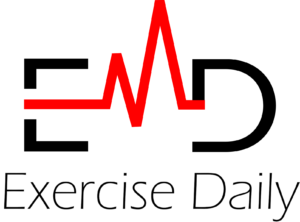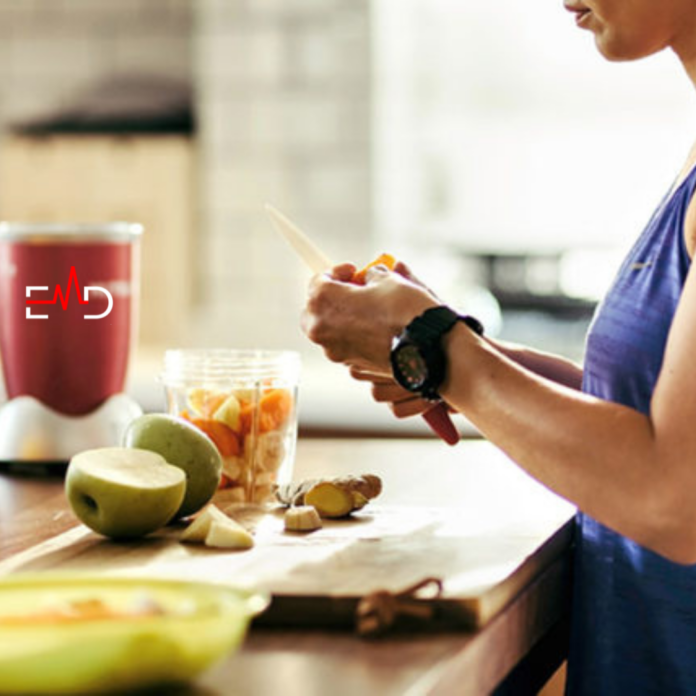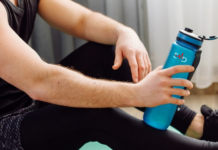Table of Contents
Exercise Daily – Athletes know that what they eat is just as important as how they train. The right foods can help them perform at their best, recover from injuries, and stay healthy. But with so many different foods and supplements out there, it can be hard to know what to eat and when. We chose the best foods for athletes. So whether you’re a beginner athlete or a seasoned pro, this blog post has the information you need to fuel your body for peak performance.
The foods you choose to fuel your body can make a significant impact on your athletic endeavors. Whether it’s preparing for a workout, replenishing your energy post-workout, or aiding in recovery, selecting the right foods can provide you with the necessary nutrients to excel in your sport.
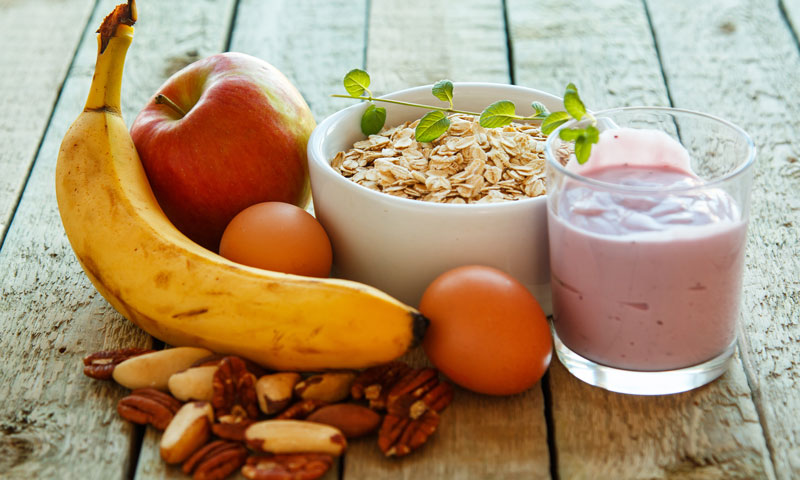
Top 10 Best Foods for Boosting Athletes’ Performance
1. Complex Carbohydrates: The Energy Source
Carbohydrates are the primary energy source for athletes. Opt for complex carbohydrates like whole grains, brown rice, quinoa, and sweet potatoes. These Best Foods for Athletes provide a sustained release of energy, helping you power through intense workouts and competitions.
Complex carbohydrates serve as a vital energy source for athletes, playing a crucial role in optimizing athletic performance. Unlike simple carbohydrates, which are quickly digested and provide a short burst of energy, complex carbohydrates provide a steady and sustained release of fuel for the athlete’s body. Foods rich in complex carbohydrates, such as whole grains, fruits, and vegetables, are low in fat and highly nutritious, providing the necessary vitamins and minerals essential for muscle growth, endurance, and overall health.
2. Lean Proteins: Building Blocks of Muscle
Protein is essential for muscle repair and growth. Include lean sources of protein such as chicken breast, turkey, fish, eggs, and plant-based options like beans and lentils in your diet. These Best Foods for Athletes supply the amino acids needed to build and maintain strong muscles.
Lean proteins, such as skinless poultry, fish, low-fat dairy products, and legumes, are low in fat and packed with vitamins and minerals necessary for a well-rounded and nutritious diet. These protein sources also contain zinc, a vital mineral for muscle recovery and immune function. Low-fat milk, in particular, provides a combination of carbohydrates and proteins, making it an excellent choice for post-workout muscle repair and replenishing glycogen stores. In addition to its muscle-building benefits, lean protein aids in digestion, keeping athletes feeling satisfied and promoting satiety.
3. Healthy Fats: Essential for Optimal Performance
Don’t shy away from fats; just choose the right ones. Healthy fats like avocados, nuts, seeds, and olive oil offer numerous benefits for athletes. They aid in hormone production, reduce inflammation, and provide a concentrated source of energy.
Healthy fats play a crucial role in the diet of athletes, as they are essential for optimal performance. While it’s important to meet energy needs and consume a balanced diet with a variety of healthy foods, including fruits and vegetables, athletes should not neglect the importance of incorporating healthy fats into their eating plan. Good nutrition goes beyond just carbohydrates and proteins; healthy fats provide a concentrated source of energy and offer numerous benefits.
4. Hydration: The Key to Staying in the Game
Staying hydrated is crucial for peak athletic performance. Water is the best choice for hydration, but you can also include natural sports drinks or coconut water for electrolyte replenishment during intense training sessions or competitions.
Hydration is the key to staying in the game and is essential for athletes to improve and maintain their performance. Proper hydration is crucial on game days, during daily training sessions, and as part of an overall healthy eating plan. Water is a vital nutrient that supports good nutrition and is a whole food that contains zero calories. Athletes must pay attention to their hydration status and ensure they consume enough fluids to meet their energy needs. Hydration not only quenches thirst but also helps athletes maintain their energy levels and prevent dehydration, which can impair athletic performance.
5. Antioxidant-Rich Fruits and Vegetables: Fighting Free Radicals
Fruits and vegetables rich in antioxidants can help combat the oxidative stress caused by intense physical activity. Include berries, leafy greens, citrus fruits, and bell peppers in your diet to reap the benefits of their antioxidant properties.
6. Nutrient-Dense Superfoods: Power-Packed Performance Boosters
Certain superfoods offer an extra nutritional punch for athletes. Incorporate foods like chia seeds, Greek yogurt, beetroot, kale, and spirulina into your diet. These superfoods provide a wide array of essential vitamins, minerals, and antioxidants.
7. Quinoa
This ancient grain is a powerhouse of nutrition. Quinoa is rich in protein, complex carbohydrates, and essential amino acids. It provides sustained energy, supports muscle recovery, and helps maintain overall health.
Quinoa, known as the “superfood” among nutrition enthusiasts, is a powerhouse of nutrients and an excellent choice for boosting athletes’ performance. Packed with high-quality protein, complex carbohydrates, and essential minerals, quinoa provides athletes with a sustainable energy source, aiding in endurance and recovery. Its complete amino acid profile makes it an ideal option for muscle repair and growth, crucial for athletes engaged in intense physical training.
8. Greek Yogurt:
Greek yogurt is a fantastic source of protein and calcium. It contains probiotics that aid in digestion and promote gut health. Enjoy it as a post-workout snack or mix it with fruits and granola for a nutritious breakfast option.
Greek yogurt, renowned for its creamy texture and tangy flavor, is an exceptional food for boosting athletes’ performance. Packed with protein, Greek yogurt offers a substantial amount of amino acids that aid in muscle repair and recovery after intense workouts. Its high protein content also promotes satiety, making it a satisfying option to help athletes feel fuller for longer periods, which can contribute to weight management and optimal energy levels.
9. Spinach:
Packed with vitamins, minerals, and antioxidants, spinach is a leafy green that can benefit athletes. It is particularly rich in iron, which helps transport oxygen to the muscles, improving endurance and performance.
Spinach, often hailed as a nutritional powerhouse, is one of the Best Foods for Athletes for boosting athletes’ performance. Packed with vitamins, minerals, and antioxidants, spinach offers numerous benefits for athletes. Its high iron content supports the production of red blood cells, which carry oxygen to muscles, improving endurance and reducing fatigue during workouts or competitions. The presence of magnesium in spinach helps maintain proper muscle function and aids in energy metabolism, contributing to optimal performance.
10. Chia Seeds:
These tiny seeds are a nutritional powerhouse. They are a great source of omega-3 fatty acids, fiber, and antioxidants. Chia seeds can help reduce inflammation, enhance hydration, and provide a sustained release of energy.
Chia seeds, tiny but mighty, are an exceptional food for boosting athletes’ performance. Packed with essential nutrients, chia seeds offer a range of benefits that can enhance athletic prowess. These seeds are an excellent source of omega-3 fatty acids, which possess anti-inflammatory properties and support cardiovascular health, allowing athletes to recover faster and perform at their best.
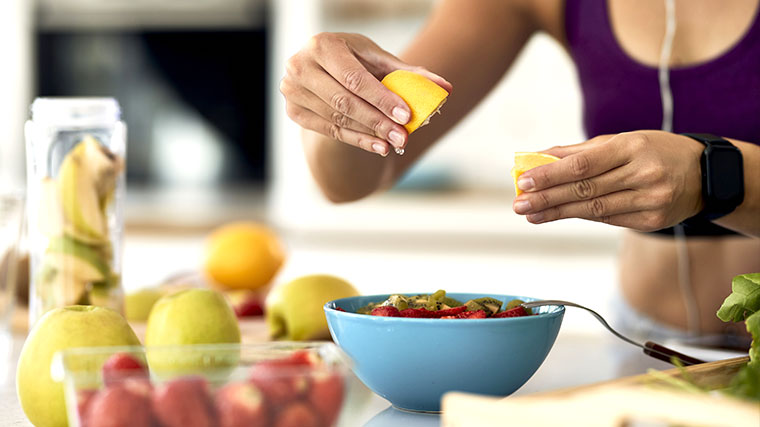
Pre-Workout Nutrition
Before engaging in any physical activity, it’s essential to fuel your body properly to enhance performance and avoid fatigue. Pre-workout nutrition should focus on providing a source of energy and promoting muscle support.
Carbohydrates are a crucial component of pre-workout meals as they provide the necessary energy for physical exertion. Opt for complex carbohydrates like whole grains, fruits, and vegetables, which release energy slowly and sustainably throughout your workout.
Protein is also important pre-workout as it helps prevent muscle breakdown during exercise. Including a lean source of protein in your pre-workout meal can provide the necessary amino acids for muscle support.
Hydration is vital as well. Ensure you’re adequately hydrated before starting your workout, and consider incorporating electrolyte-rich fluids to maintain the balance of minerals in your body.
Best Pre-Workout Foods
- Oatmeal with berries and nuts: A bowl of oatmeal topped with fresh berries and a sprinkle of nuts provides a balanced combination of complex carbohydrates, fiber, and healthy fats.
- Greek yogurt with fruits and honey: Greek yogurt is packed with protein, and when paired with fruits and a drizzle of honey, it becomes a delicious pre-work out option that offers a good balance of macronutrients and natural sugars for sustained energy.
- Whole grain toast with almond butter and banana slices: Whole grain toast provides complex carbohydrates, while almond butter adds healthy fats and protein. Top it off with banana slices for an additional source of energy and potassium.
- Smoothie with spinach, berries, and protein powder: Blend spinach, mixed berries, and a scoop of protein powder with your choice of liquid (such as almond milk or water). This refreshing pre-workout option delivers antioxidants, vitamins, minerals, and protein in one convenient package.
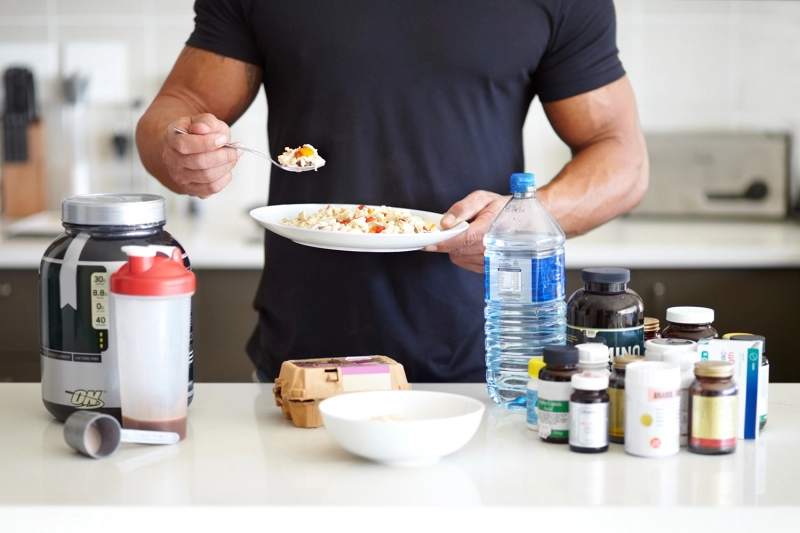
Post-Workout Nutrition
After an intense workout, your body needs replenishment to aid in muscle recovery and glycogen restoration. Post-workout nutrition should focus on providing protein for muscle repair, carbohydrates for glycogen replenishment, and antioxidants for reducing inflammation.
Consuming protein after a workout is essential as it helps repair and rebuild damaged muscle tissue. Aim for a high-quality protein source to maximize the benefits.
Carbohydrates are crucial for replenishing glycogen stores, which serve as an energy source during workouts. Opt for complex carbohydrates to promote sustained energy release.
Including foods rich in antioxidants can help reduce inflammation caused by intense physical activity. This aids in the recovery process and prepares your body for the next workout.
Best Post-Workout Foods
- Grilled chicken with sweet potatoes and vegetables: Grilled chicken offers lean protein, while sweet potatoes provide complex carbohydrates. Add a side of colorful vegetables to enhance the nutrient profile of this post-workout meal.
- Salmon with quinoa and roasted asparagus: Salmon is an excellent source of protein and healthy fats, such as omega-3 fatty acids. Pair it with quinoa, a protein-rich grain, and roasted asparagus for a nutrient-dense post-workout option.
- Whole grain pasta with lean ground turkey and marinara sauce: Whole grain pasta provides carbohydrates, while lean ground turkey offers protein. Top it with a flavorful marinara sauce for a satisfying post-workout meal.
- Veggie omelet with whole wheat toast: Whip up a veggie omelet using egg whites or whole eggs for protein. Serve it with whole wheat toast for additional carbohydrates and fiber.

Recovery Nutrition
Recovery nutrition is crucial for repairing muscle damage, reducing inflammation, and promoting overall health. It involves consuming nutrient-dense foods that support the body’s recovery process.
Protein is vital for muscle recovery, as it helps repair damaged muscle fibers. Incorporate sources of lean protein in your meals to aid in this process.
Healthy fats, such as those found in nuts, seeds, avocados, and fatty fish, help reduce inflammation and support joint health. Including these fats in your diet can aid in the recovery process.
Micronutrients, including vitamins and minerals, play a crucial role in various physiological processes. Consuming a variety of fruits and vegetables ensures you obtain the necessary micronutrients for optimal recovery.
Best Recovery Foods
- Almonds and dried fruits: Almonds offer healthy fats and protein, while dried fruits provide natural sugars and micronutrients. This combination makes for a portable and nutrient-dense snack for athletes on the go.
- Avocado with whole grain crackers: Avocado is rich in healthy fats, fiber, and micronutrients. Pair it with whole grain crackers for a satisfying and nourishing recovery snack.
- Chia seed pudding with mixed berries: Chia seeds are packed with omega-3 fatty acids, fiber, and protein. Combine them with mixed berries for a delicious and nutritious recovery dessert or snack.
- Spinach salad with grilled chicken and avocado: A salad made with fresh spinach, grilled chicken and creamy avocado creates a nutrient-packed meal for post-workout recovery. Spinach provides an abundance of vitamins and minerals, while grilled chicken offers high-quality protein. Avocado adds healthy fats and a creamy texture to the salad.
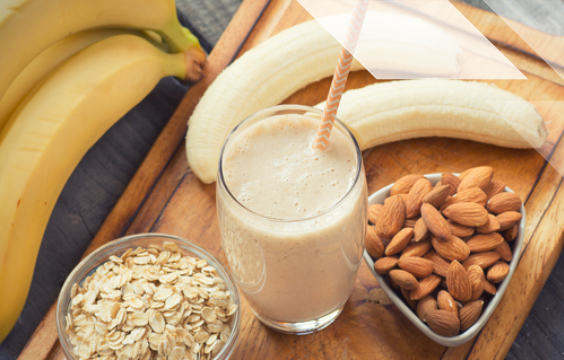
Athlete Diet Fueling for Performance
Athletes constantly push their bodies to perform at their best, and to achieve peak performance, a well-balanced and properly fueled diet is essential. This article aims to provide valuable insights into the athlete’s diet, focusing on the right nutrition strategies to optimize performance and overall health.
Macronutrients: The Building Blocks of an Athlete’s Diet
Macronutrients, including carbohydrates, proteins, and fats, provide the necessary energy and nutrients for athletes.
3.1 Carbohydrates
Carbohydrates are the primary fuel source for physical activity. They are crucial for providing energy during high-intensity workouts and replenishing glycogen stores. Athletes should focus on consuming complex carbohydrates such as whole grains, fruits, and vegetables.
3.2 Proteins
Proteins are essential for muscle repair and growth. Athletes should aim to consume high-quality proteins from sources like lean meats, fish, eggs, and legumes. Adequate protein intake helps with post-workout recovery and reduces muscle breakdown.
3.3 Fats
While often misunderstood, healthy fats play a vital role in an athlete’s diet. They provide a concentrated source of energy and aid in the absorption of fat-soluble vitamins. Athletes should opt for sources like avocados, nuts, seeds, and olive oil.
Micronutrients: Essential for Optimal Athletic Performance
Micronutrients, including vitamins and minerals, are required in smaller quantities but are equally important for an athlete’s overall well-being and performance.
4.1 Vitamins
Vitamins act as coenzymes in various metabolic processes and play a significant role in energy production and muscle function. A varied diet that includes a colorful array of fruits and vegetables ensures an adequate intake of vitamins.
4.2 Minerals
Minerals such as calcium, iron, and zinc are essential for bone health, oxygen transport, and immune function. Athletes should consume a balanced diet rich in whole grains, dairy products, lean meats, and leafy green vegetables to meet their mineral requirements.
Hydration: Staying Well-Nourished and Hydrated
Proper hydration is crucial for athletes to maintain optimal performance. Water is the primary component of blood and helps regulate body temperature. Athletes should drink fluids before, during, and after exercise to prevent dehydration. Electrolyte-rich drinks can be beneficial for intense and prolonged workouts.
Pre-Workout Nutrition Strategies
Pre-workout meals should focus on providing sustained energy. A combination of complex carbohydrates, lean proteins, and healthy fats is ideal. Timing is key, and athletes should consume their pre-workout meal 2-3 hours before exercise to allow for proper digestion.
Fueling During Exercise
For prolonged workouts or endurance events, consuming carbohydrates during exercise can help maintain energy levels. Sports drinks, gels, and easily digestible snacks can provide quick fuel without causing gastrointestinal discomfort.
Recovery Nutrition: Replenishing the Body
Post-workout nutrition is critical for muscle recovery and glycogen replenishment. Athletes should aim to consume a combination of carbohydrates and proteins within 30 minutes to an hour after exercise. This can be in the form of a protein shake, yogurt with fruits, or a balanced meal.
Tailoring the Athlete’s Diet: Individual Variations
Each athlete has unique nutritional requirements based on factors such as age, sex, sport, and training intensity. Consulting with a sports dietitian can help develop personalized meal plans that address specific needs and optimize performance.
Common Pitfalls to Avoid
- Skipping Meals: Irregular eating patterns can lead to nutrient deficiencies and hinder performance.
- Relying on Supplements: Whole foods should be the primary source of nutrients, with supplements used to complement a well-rounded diet.
- Neglecting Recovery Nutrition: Failing to refuel and replenish after exercise can delay recovery and impair future performance.
The Role of Supplements
Supplements should be used judiciously and under professional guidance. While some athletes may benefit from specific supplements, such as protein powders or vitamins, relying solely on supplements can never replace a balanced diet.
Conclusion
Fueling your body with the right foods before, during, and after workouts is essential for athletes to perform at their best and support proper recovery. Pre-workout meals should include a combination of carbohydrates, protein, and hydration to provide sustained energy and muscle support. Post-workout nutrition should focus on replenishing glycogen stores, repairing muscle tissue with protein, and reducing inflammation with antioxidants. Recovery nutrition emphasizes the consumption of nutrient-dense foods that promote muscle repair, reduce inflammation, and support overall health.
FAQs – Best Foods for Athletes
What should I eat before an early morning workout?
It’s best to have a light pre-workout snack that includes easily digestible carbohydrates and a small amount of protein. Options like a banana or a slice of whole grain toast with peanut butter can provide the necessary energy without causing discomfort during exercise.
Can I rely on protein shakes for post-workout nutrition?
Protein shakes can be a convenient option for post-workout nutrition, especially when combined with carbohydrates. However, it’s important to prioritize whole foods that offer a wider range of nutrients. Protein shakes can supplement your diet but should not replace a balanced meal.
Are there any foods I should avoid before a workout?
It’s best to avoid heavy, greasy, and high-fiber foods before a workout, as they can lead to digestive discomfort. Additionally, Best Foods for Athletes that are high in added sugars may cause a rapid energy spike followed by a crash. Opt for light, easily digestible options instead.
How soon should I eat after a workout?
It’s ideal to consume a post-workout meal or snack within 30 minutes to an hour after finishing your workout. This allows for optimal nutrient absorption and aids in muscle recovery.
Is it necessary to take supplements for recovery?
While supplements can be beneficial in certain cases, they should not replace a well-rounded diet. It’s always best to obtain nutrients from whole foods whenever possible. Consult with a healthcare professional or registered dietitian before considering any specific supplements for your recovery needs.

